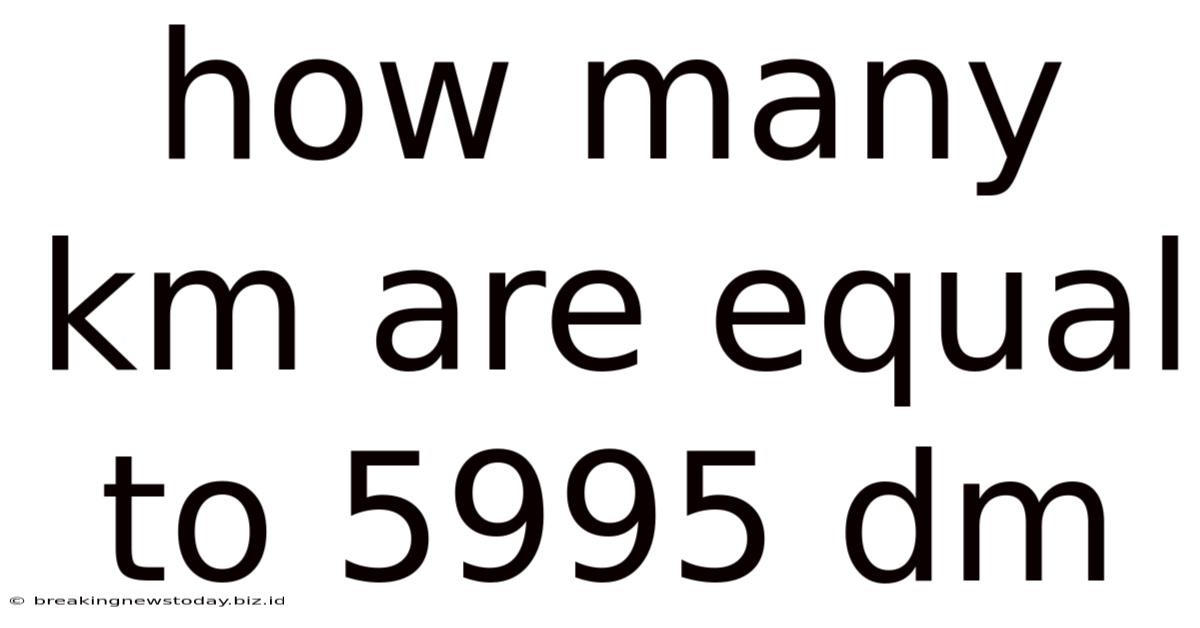How Many Km Are Equal To 5995 Dm
Breaking News Today
Jun 08, 2025 · 4 min read

Table of Contents
How Many Kilometers are Equal to 5995 Decimeters? A Comprehensive Guide to Metric Conversions
Understanding metric conversions is crucial in various fields, from everyday life to scientific research. This comprehensive guide will delve into the conversion of 5995 decimeters (dm) to kilometers (km), explaining the process step-by-step and providing valuable context for similar conversions. We'll explore the metric system, its prefixes, and practical applications, ensuring you master this essential skill.
Understanding the Metric System
The metric system, or International System of Units (SI), is a decimal system based on powers of 10. This makes conversions remarkably straightforward compared to other systems like the imperial system. The core units are meter (m) for length, kilogram (kg) for mass, and liter (l) for volume. All other units are derived from these base units using prefixes that indicate multiples or submultiples of 10.
Key Metric Prefixes
Understanding the prefixes is key to navigating the metric system. Here are some of the most commonly used prefixes, along with their corresponding multipliers:
- Kilo (k): 1000 times the base unit (1 km = 1000 m)
- Hecto (h): 100 times the base unit (1 hm = 100 m)
- Deca (da): 10 times the base unit (1 dam = 10 m)
- Deci (d): 1/10 of the base unit (1 dm = 0.1 m)
- Centi (c): 1/100 of the base unit (1 cm = 0.01 m)
- Milli (m): 1/1000 of the base unit (1 mm = 0.001 m)
Converting Decimeters to Meters
Before converting decimeters to kilometers, we must first convert decimeters to meters. Remember, one decimeter is one-tenth of a meter. Therefore, the conversion factor is:
1 dm = 0.1 m
To convert 5995 decimeters to meters, we multiply the number of decimeters by the conversion factor:
5995 dm * 0.1 m/dm = 599.5 m
Therefore, 5995 decimeters are equal to 599.5 meters.
Converting Meters to Kilometers
Now, we convert meters to kilometers. One kilometer is equal to 1000 meters. The conversion factor is:
1 km = 1000 m
To convert 599.5 meters to kilometers, we divide the number of meters by the conversion factor:
599.5 m / 1000 m/km = 0.5995 km
Therefore, 5995 decimeters are equal to 0.5995 kilometers.
Practical Applications of Metric Conversions
Understanding metric conversions is essential in many real-world scenarios:
-
Construction and Engineering: Accurate measurements are crucial for building structures, designing machines, and ensuring safety. Converting between different metric units ensures precision in these fields.
-
Manufacturing and Production: Manufacturing processes often involve precise measurements of materials and components. Proper metric conversions ensure that parts fit correctly and products meet quality standards.
-
Science and Research: Scientific experiments and data analysis often rely on accurate measurements. The metric system’s precision makes it the standard for scientific work worldwide.
-
Navigation and Mapping: Geographical coordinates and distances are often expressed in kilometers. Converting between units like decimeters and kilometers is necessary for accurate calculations in navigation and mapping applications.
-
Everyday Life: Even in everyday activities, understanding metric conversions can be helpful. Measuring ingredients for cooking, understanding distances, or even reading product labels often involves converting between different metric units.
Further Exploration of Metric Conversions
The process demonstrated above can be applied to other metric unit conversions. The key is to understand the prefixes and their corresponding multipliers. For instance:
-
Converting Centimeters to Kilometers: First, convert centimeters to meters (1 cm = 0.01 m), then convert meters to kilometers (1 km = 1000 m).
-
Converting Millimeters to Kilometers: First, convert millimeters to meters (1 mm = 0.001 m), then convert meters to kilometers (1 km = 1000 m).
-
Converting Kilometers to Meters: Simply multiply the number of kilometers by 1000.
-
Converting Kilometers to Centimeters: First, convert kilometers to meters (1 km = 1000 m), then convert meters to centimeters (1 m = 100 cm).
Common Mistakes to Avoid
While metric conversions are relatively straightforward, common mistakes can occur:
-
Incorrect Conversion Factors: Using the wrong conversion factor is the most prevalent error. Double-check your conversion factors to ensure accuracy.
-
Misplacing the Decimal Point: When multiplying or dividing by powers of 10, be careful to place the decimal point correctly.
-
Mixing Units: Avoid mixing units within a calculation. Always convert all values to the same unit before performing calculations.
Conclusion: Mastering Metric Conversions
Mastering metric conversions is a valuable skill with broad applications. This guide provided a step-by-step explanation of converting 5995 decimeters to kilometers, highlighting the importance of understanding the metric system and its prefixes. By applying these principles and avoiding common mistakes, you can confidently perform a wide range of metric conversions and ensure accuracy in your work. Remember the core principle: the metric system is based on powers of 10, simplifying the process immensely. Practice regularly, and soon you'll be effortlessly converting between different metric units. Understanding these conversions opens doors to numerous applications, improving precision and efficiency in various aspects of life.
Latest Posts
Latest Posts
-
What Number Sentence Does This Model Show
Jun 08, 2025
-
Brake Fluid Expands And Contracts With Changes In Temperature
Jun 08, 2025
-
A Number Cube Numbered 1 6 Is Rolled Once
Jun 08, 2025
-
Which Sentence Is The Clearest Example Of Alliteration
Jun 08, 2025
-
What Is The Value Of The Underlined Digit 56
Jun 08, 2025
Related Post
Thank you for visiting our website which covers about How Many Km Are Equal To 5995 Dm . We hope the information provided has been useful to you. Feel free to contact us if you have any questions or need further assistance. See you next time and don't miss to bookmark.